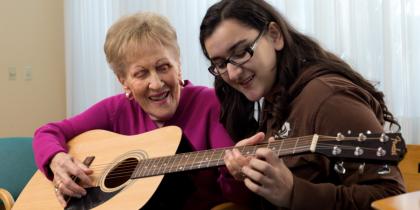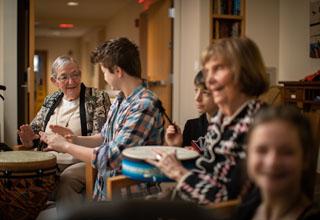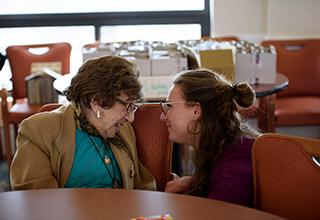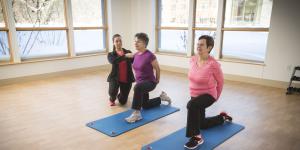How Intergenerational Friendships Can Enrich Your Life
Read about the unique benefits of having friends who aren’t your age.

Hannah first met Ammi in September 2022 through Hebrew SeniorLife’s one-on-one volunteer program. Hannah, a young adult volunteer, was paired with Ammi, a then 89-year-old Center Communities of Brookline resident, to help him format his memoir in Microsoft Word. In doing so, a deeper friendship blossomed.
“As cliché as it may seem, Ammi has taught me that age is truly just a number. His vibrancy and zest for life have remained steadfast in his 89 years. Each time I [met] with Ammi, I learn[ed] something new. Did you know… that adding half powdered and half liquid milk makes a chai tea creamier?” says Hannah.
Their friendship soon evolved “from technical assistance by a stranger to approaching a quasi-granddaughter relationship,” says Ammi. “It’s really important for this elder… to stay in contact with very young people to keep the older self younger, to remind me of my more youthful days.” While Hannah has since moved away from Boston, she and Ammi are still in touch today. Additionally, she connected him with one of her friends, who has been working with him on another writing project.
Intergenerational friendships like the one between Hannah and Ammi can provide value that you don’t always get with friends your age. Research from AARP found that 93% of people with a close intergenerational friend agree that having a friend in a different age group offers unique benefits that they don’t get from friendships with people similar in age to them.
What are the benefits of intergenerational friendships?
The same research found that adults with a close younger friend tend to believe that their friend is more likely than friends close in age to help them see another perspective, give them a greater appreciation for their experiences, and allow them to voice their opinions and insights. Adults with a close older friend believe that their friend is more likely to help them see another perspective, inspire them, and provide them with a role model.
Gabrielle Bailey, a 21-year old Northeastern University undergraduate student who has been volunteering at Hebrew SeniorLife’s Center Communities of Brookline for the past year in one-on-one and group settings, agrees that intergenerational friendships bring unique benefits.
“There’s the idea of connecting with somebody who you normally wouldn’t, and getting a different perspective. Residents are all very happy to talk to me, and that’s very rewarding, so there’s that aspect to it. But for me personally, I also really like the way that older people communicate. I find that younger people can be guarded, and sometimes performative, but as people get older, I think they get more comfortable with themselves in a lot of ways. It’s definitely been influential to me and how I communicate with people,” says Gabrielle.
Intergenerational friendships can even help fight ageism. Adults with close intergenerational friendships are more likely to have a positive attitude about aging than those without them.
Intergenerational friendships may also play a role in combating the epidemic of loneliness older adults are facing. According to the U.S. Surgeon General, loneliness and social isolation increase your risk for premature death by 26% and 29%, respectively. That’s a similar increased risk of premature death as smoking up to 15 cigarettes every single day!
“We know that loneliness and social isolation are widespread among seniors. Intergenerational friendships provide a powerful solution, creating opportunities for older adults to build meaningful relationships while being valued for their wisdom and experience. There’s nothing quite like witnessing the spark of connection between a young adult and a senior with nearly a century of life lessons to share,” explains Marissa Birne, program manager for youth, arts, and volunteer initiatives at Hebrew SeniorLife.
Gabrielle has even gone out of her way to introduce family members to residents with whom she’s formed connections. “I’ve brought my dad and brother volunteering with me to meet residents. They really do feel like my friends and I’m excited to introduce my family members to them. The community and Hebrew SeniorLife has become a part of my life and part of my network,” she says.
Time and time again, research has shown that intergenerational friendships have a positive impact on younger and older friends alike. That impact trickles down to the youngest of age groups. One study revealed positive impacts of intergenerational programs on child development for children as young as nine weeks old, and a larger breadth of research has demonstrated significant benefits for elementary school, middle school, and high school students who participate in intergenerational programs. In other words, intergenerational friendships benefit everyone.
Tips for making new friends outside of your age group
While the benefits of making new friends, including intergenerational friends, are clear, it doesn’t always feel easy to make new connections. The American Survey Center found that around one in three seniors haven’t made a new friend in at least five years. The same survey found that the workplace is the most common place for Americans to form new friendships.
But what about people who aren’t working? Here are some of the other places people are making friends:
- At a current or previous school (54% of Americans with close friends)
- Through an existing network of friends (47%)
- In their neighborhood (35%)
- At their place of worship (21%)
- Through a club or organization they are part of (16%)
One of our previous blog posts offers some tips on how to make new friends, and you can use many of those same tips to seek out intergenerational friendships too! Shared interests can be a great starting point for conversations and forming connections with people who aren’t your age. Book clubs, fitness classes, garden clubs, art classes, or any place that welcomes people of all ages where you can do something that interests you are great ways to meet people. This could mean stepping outside of your comfort zone by showing up somewhere new.
A shared interest — a mutual love of jazz music — is what brought together Arnau, a young adult volunteer at Hebrew SeniorLife, and Arthur, an older adult patient. They met the first day that Arnau performed a jazz piano concert as a volunteer.
“Arthur came up to me afterward and gave me major compliments, especially with respect to my rendition of ‘Round Midnight,’ a piece of music written by one of Arthur’s favorites. After a few more Sunday concerts, Arthur asked if he could play his congas with me sometime, to which I was thrilled to say ‘Yes!’” says Arnau. Now, they regularly get together even after the concerts to “have some fun and build some cohesion as a duo,” he adds.
How Hebrew SeniorLife facilitates intergenerational friendships
It is possible to form intergenerational friendships while you’re living on your own. But if you’re thinking about moving to a senior living community, consider prioritizing one that’s intentional about building and supporting intergenerational connections.
That’s exactly what Hebrew SeniorLife has done through the Adam and Matan Adelson Multigenerational Program. Hebrew SeniorLife offers intergenerational programs on every campus, facilitating both group and one-on-one connections between senior residents and patients and student volunteers from the community. These programs include partnerships with schools ranging from preschool to college-age students. Individual volunteers are thoughtfully paired with seniors based on factors like shared interests, communication styles, values and belief systems, and shared language.
There are also a range of multigenerational activities, such as board games, arts and crafts, journaling, trivia, and regular multigenerational discussion groups. Each multigenerational discussion focuses on a different theme, with one recent example being a conversation around artificial intelligence and the future of technology. These discussions give residents the opportunity to form connections with volunteers organically, providing mutually meaningful relationships in a group setting.
“There are so many benefits for the young people who participate in these programs. They might come in with the intention of having a positive impact in seniors’ lives, but what we find is that the experience is just as transformative for them. They have someone listening to them, getting to know them, and rooting for them in every way. That’s something all children and young adults need,” says Marissa.
Marissa has seen the impact of these discussion groups firsthand. “When asked about accomplishments from the previous year, one student said that he had gotten into college. Another said that she’d had a tough time in one of her classes and ended up persisting and earning a grade she was proud of. Everyone just burst into applause cheering for them,” she adds.
Gabrielle describes the friendships she has made with older adults as a Hebrew SeniorLife volunteer as transformative. “There’s these things that you’re ‘supposed to do’ in college. You’re supposed to study abroad, maybe rush a sorority. I would say volunteering in a senior organization should definitely be on that list. It’s been really impactful to my perspective about the values I want to hold in my life and the decisions I’ll make based on those values,” she explains.
Connect with older adults as a Hebrew SeniorLife volunteer
Our volunteers work with older adults at all levels of independence and needs. We have opportunities ranging from visiting one-on-one with patients and residents, to providing support for the occupational and expressive therapy teams, internship opportunities for students, and more. We’ll work with you to find the best fit for your interests, talents, and schedule. Learn more about volunteering opportunities today.
Blog Topics
Learn More
Intergenerational Programs
Operating across Hebrew SeniorLife communities, our multigenerational programming is designed to support the needs of old and young alike.

Volunteer at HSL
From volunteering for our hospice program to participating in an intergenerational program, we offer many opportunities to make a difference in the lives of seniors.





